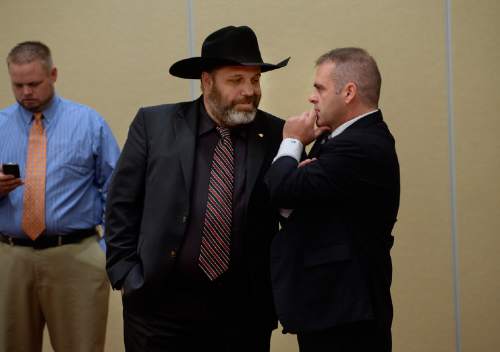This is an archived article that was published on sltrib.com in 2014, and information in the article may be outdated. It is provided only for personal research purposes and may not be reprinted.
Prosecutors say a federal judge improperly dismissed charges against Rick Koerber, the Utah County businessman who had been accused of operating a $100 million Ponzi scheme.
The U.S. Attorney's Office for Utah on Friday asked the 10th Circuit Court of Appeals to overturn the decision of U.S. District Judge Clark Waddoups to dismiss the case against Koerber "with prejudice," meaning prosecutors can't refile charges.
The dismissal in August was based on findings of violations of the Speedy Trial Act, which aims to bring cases to trial quickly but is generous in allowing delays if they are for specific reasons and timely filed in the court record. Waddoups chided prosecutors for a lackadaisical approach to the Speedy Trial Act requirements. In dismissing the five-year-old case with prejudice, the judge said they violated ethical standards and the Constitution.
But in their brief to the 10th Circuit, prosecutors argued that most of the blame for the delays in the case is attributable to Koerber and his attorney, Marcus Mumford.
"Koerber constantly requested delays so he could file motions throughout the case," the brief says, pointing to Mumford's motion to dismiss entered less than four weeks after resisting an attempt to schedule a trial.
Mumford told The Tribune on Friday, "We stand by ... the judge's decision to dismiss this matter based on what he characterized as the government's 'widespread and continuous pattern of misconduct' in this case. We will review this brief and make our response to the court."
The 10th Circuit then typically will schedule oral arguments before issuing a decision.
About a third of the 64-page prosecutor's brief is devoted to explaining how Koerber himself was responsible for most delays. But prosecutors also cited Waddoups for failing to approve one of their motions to exclude delays from counting under the Speedy Trial Act while later accusing them of incompetence in managing the act's requirements.
The prosecution misconduct relied on by Waddoups in his decision also was not relevant to Speedy Trial Act violations, the brief says, and Koerber's ability to defend himself was not harmed by the delays.
"Koerber also suffered no prejudice because, as his constant resistance to trial dates shows, he never wanted to go to trial," they said.
Koerber's real estate investment operation had taken in about $100 million, but returned about $50 million to investors as part of an alleged Ponzi scheme to make his unprofitable companies appear profitable and continue to attract investors, the government claimed through three different indictments.
Koerber had been facing 18 charges of fraud, money laundering and tax evasion. He was looking at up to 20 years in prison if convicted on the wire fraud charge.





